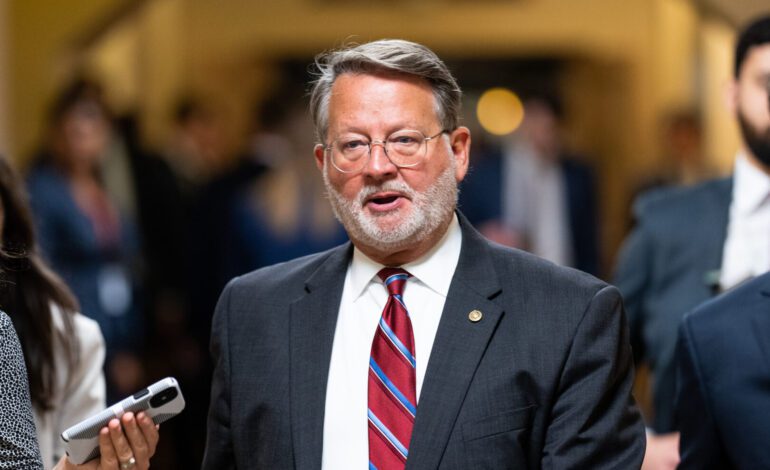WASHINGTON, D.C. – U.S. Senator Gary Peters (D-MI), chairman of the Homeland Security and Governmental Affairs Committee, introduced legislation to reform the traveler redress process and improve screening practices at airports and ports of entry that repeatedly affect individuals who may pose no danger to national security.
The bill would require the secretary of the Department of Homeland Security (DHS) to provide Congress with a comprehensive plan to reform the redress process and ensure counterterrorism resources are used effectively. This bill will help evaluate a ballooning set of screening processes, some related to the terror watchlist, by improving transparency about these processes and by reforming the redress process to allow affected Americans to seek an effective remedy if they believe they are mistakenly caught in this system.
“We must ensure our travel screening practices protect the nation without unfairly burdening law-abiding citizens,” Peters said. “My bill will seek to improve current screening practices and ensure there is a plan to fix the redress process for innocent Americans. By doing so, we can strengthen public trust in our screening practices, increase transparency into the screening system, and protect travelers’ civil rights and civil liberties.”
In December 2023, Peters published a report that revealed that well-intentioned screening practices at airports and other ports of entry have ballooned over time, often at the expense of travelers who may pose no threat to national security. Members of the Arab, Muslim and South Asian American communities report that they are unfairly targeted by these screening practices; however, federal agencies do not effectively assess whether discrimination occurs in these processes.
These practices are intended to protect the U.S. from terrorists and other security threats, but these practices have expanded into a layered and duplicative screening system that is difficult for the government to explain, and for American citizens to understand why they have been flagged for secondary screening or how they can seek real redress.

The Enhanced Oversight and Accountability in Screening Act would require DHS to provide Congress with a plan to meaningfully reform the redress process and improve the experience of individuals who believe they have been wrongly subjected to additional screenings or have experienced delays in travel. The bill establishes a DHS Screening and Watchlisting Advisory Committee, comprised of both governmental and non-governmental representatives, to advise the secretary on the development, refinement, implementation and evaluation of security processes.
To enhance transparency, the bill also mandates the DHS secretary to provide Congress with a report assessing the effectiveness of secondary screenings and inspections by the Transportation Security Administration (TSA) and U.S. Customs and Border Protection (CBP).
Arab American Civil Rights League (ACRL) Chairman Nabih Ayad said he welcomes this proposal, but there are still steps that need to be taken. He was a part of the Mokdad vs. Holder court case regarding the no fly list. He said they argued in front of the United States Circuit Court of Appeals and were able to successfully bring back a United States Citizen who was on that list.
“We welcome this new proposed legislation, I think it’s a step forward,” he said. “I don’t think it’s going to solve all our issues by any means, but I think we’ll start to at least be more focused on targeting certain cases as opposed to, like I said, brushing with a very wide brush and just putting everybody into this list and try to get out of it.”
Below are statements in support of the senator’s legislation from a press release:
“We are grateful for Chairman Peters and the committee’s ongoing efforts to shed light on the government’s risk assessment and watchlisting practices,” said Faiza Patel, senior director of the Brennan Center for Justice’s Liberty and National Security Program. “Twenty years in, the public knows little about how DHS screens travelers, whether the programs even work and how they impact our rights and privacy. This legislation is an important step toward bringing the scrutiny that these practices require to ensure they are effective and bias-free.”
“This much-needed reform balances national security with civil rights, ensuring those wrongly flagged can seek timely and fair redress,” said Wa’el Alzayat, CEO of Emgage Action. “Establishing the Screening and Watchlisting Advisory Committee, with representatives from civil society, is a significant step toward accountability and fairness. Integrating community feedback ensures affected voices are heard. The Enhanced Oversight and Accountability in Screening Act provides a path for a more equitable and accountable system. Emgage Action supports this legislation and will remain vigilant in protecting the rights and liberties of all individuals.”
“This legislation is an important first step in addressing the many issues surrounding the U.S. government’s watchlisting enterprise,” said Abed Ayoub, national executive director of the American-Arab Anti-Discrimination Committee (ADC). “For far too long our community has been directly impacted by these unconstitutional policies. We thank Sen. Peters and the staff of the Homeland Security Committee for persevering and pushing this legislation, and we look forward to working towards real progress.”






Leave a Reply